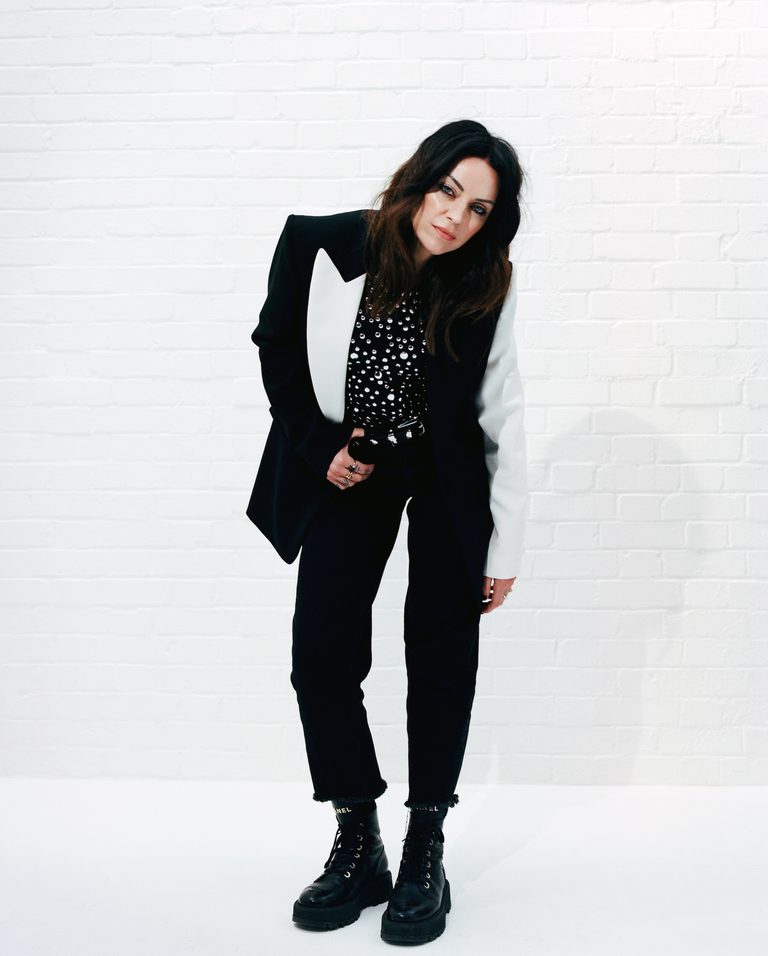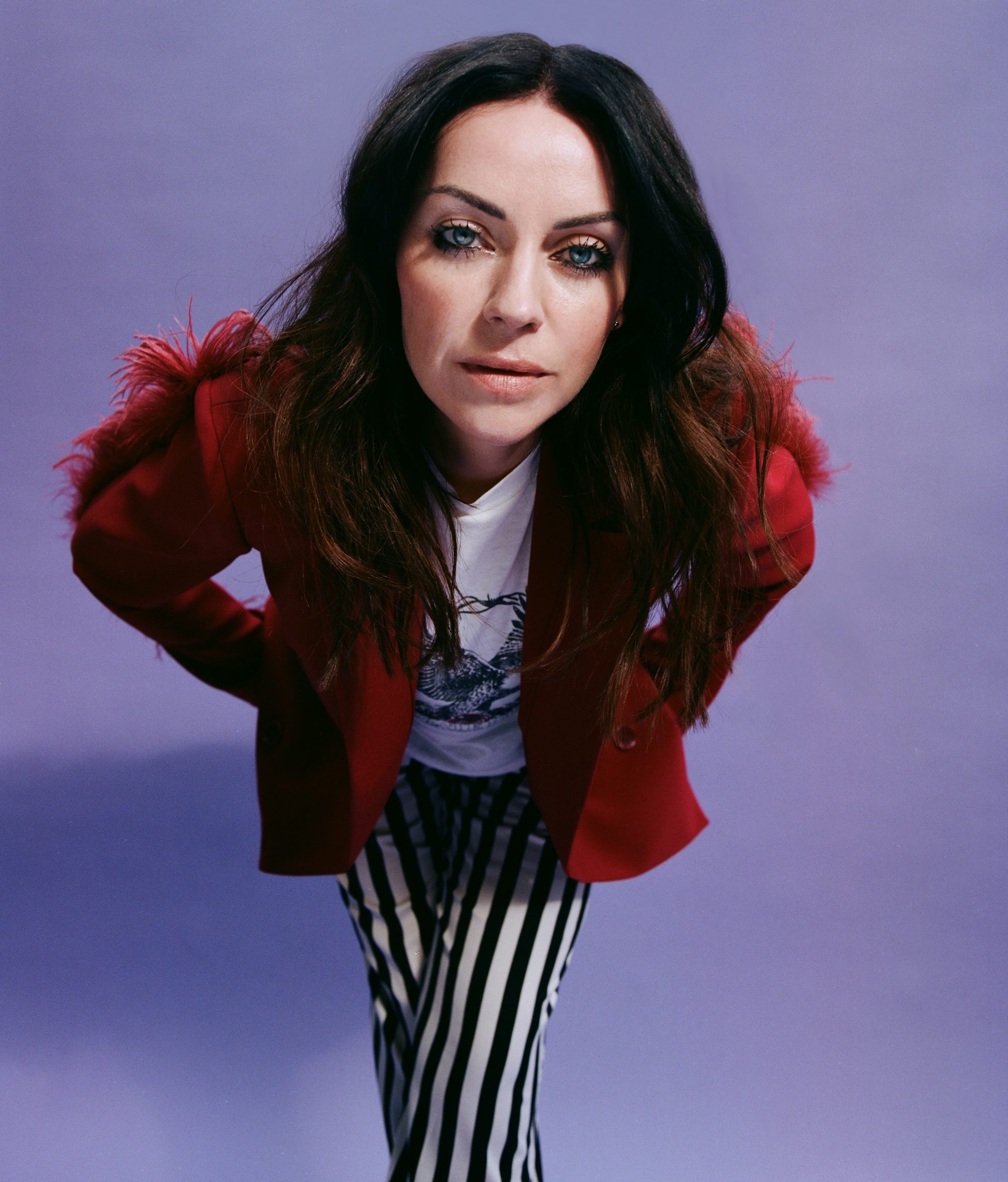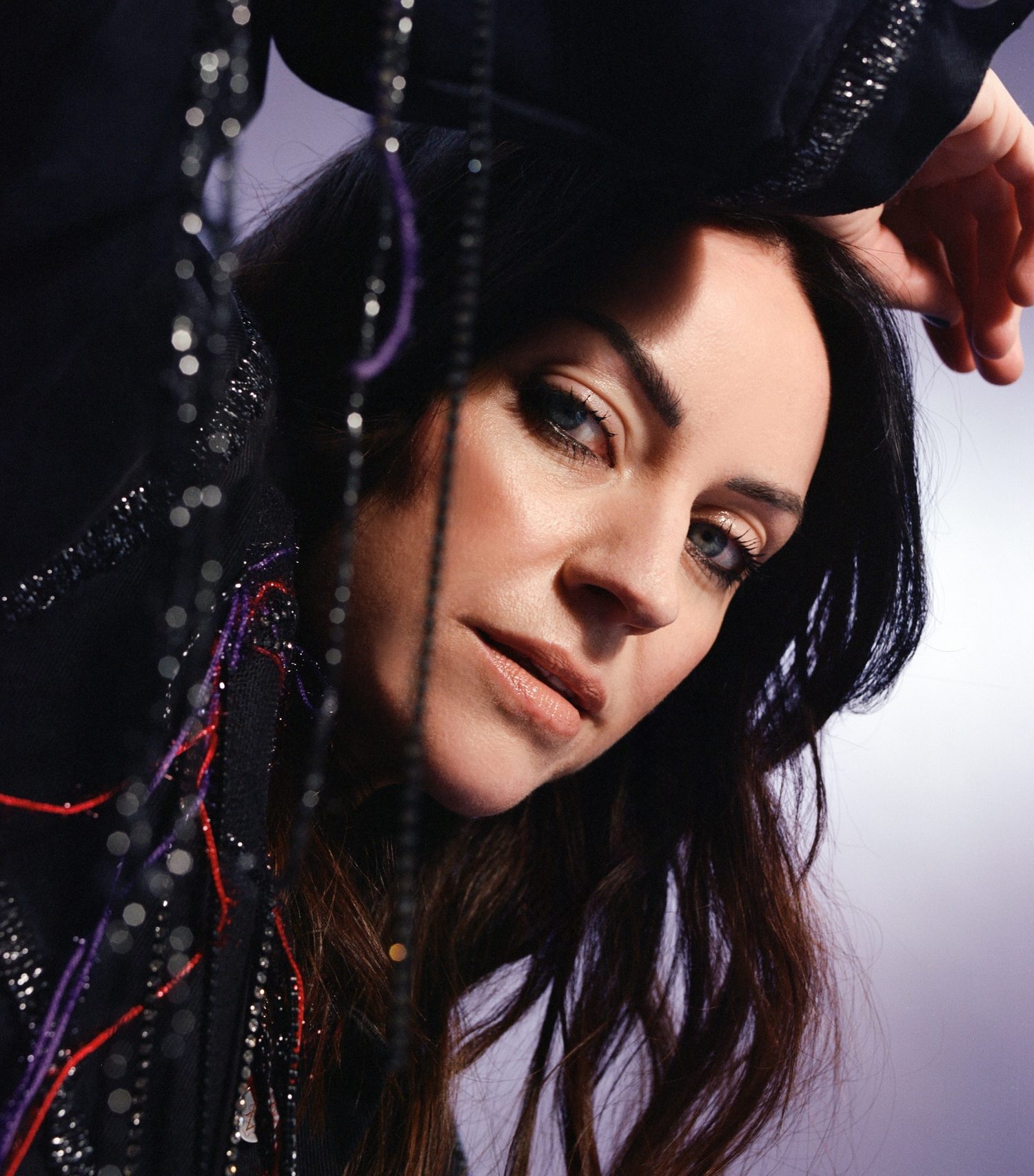
Amy Macdonald is playing the long game
Scottish singer/songwriter Amy Macdonald has stayed grounded writing survival anthems for uncertain times – but with her sixth record Is This What You've Been Waiting For? she's speaking truth to the human experience, writes Max Gayler.
It’s been nearly two decades since Amy Macdonald first sang “This is the Life,” a title that became less a lyric and more a prophecy.
Since then, she’s performed in sold-out arenas, topped European charts, and earned her place as one of Scotland’s most quietly enduring songwriters. But if there’s a thread that ties her career together, it’s not the viral hits or big stages, it’s a refusal to let the machine of fame turn her into someone she’s not.
“I was a teenager and I’d been thrown into this crazy world, not really knowing what the hell I was doing,” the 37-year-old Scot tells me. “There were loads of times where I was like, surviving with no sleep. I found that quite tough.” Her success, in a sense, has always been measured in survival.
That spirit is alive and well on Is This What You've Been Waiting For?, a record shaped as much by its silences as its sounds. Written after a five-year gap between albums, the songs stretch across themes of endurance, gratitude, and defiance. It’s a collection of work that speaks softly, even as it asks big questions about what it means to keep going in a collapsing world.
And yet, as always, Macdonald doesn’t shout her message, she just trusts that listeners will find it. “I just want to write songs that people can relate to and things that they can listen to, and it makes them feel something,” she says plainly. “That’s the most important part.”
To kick off her return earlier this year, Macdonald hosted a small show in Zermatt, Switzerland—a stripped-back acoustic set where she debuted unreleased songs to an intimate crowd. But before she played a note, she made a simple request: no filming. “There was that anxiety, and also not wanting the first time that people hear them to be on like a grainy YouTube video,” she explained. “So I actually asked the crowd not to film them, and it was amazing because everybody ended up just not having their phone out for the entirety of the show.”
It wasn’t a command. More like an invitation. She told the audience why it mattered, and they responded not just with understanding, but enthusiasm. “I explained why, and people seemed to love it. They all, like, cheered.” The reward was a reminder of how powerful simple presence can be.
“I think people actually really liked it, it made them kind of realise what it used to be like,” she says. After the show, fans messaged her to say how refreshing it had felt to just be there, completely. No screens between them and the songs. “It was just nice to just be in the moment and just enjoy it and not feel like you have to constantly catch it.”
“I've spent all this time trying to get this music perfect,” she told the crowd. “And I don't want people to have their first exposure to it on a crap phone video.”
These aren’t grand, revolutionary gestures. They’re small, human choices—made by someone who still sees music as an act of mutual attention. When she’s on stage, Macdonald's favorite part isn’t the spotlight, it’s watching everyone else. “My favorite part about performing is actually just people watching, and I'm a massive people watcher,” she admits through a smile. “When you're on the stage, you can literally see everybody and everything.”
And that’s the paradox of Amy Macdonald's fame. After all these years, she’s still the one looking out at the crowd, not waiting for them to look back.
As with many of Macdonald's past records, the new album plays with big emotions. But this time, there’s a darker undertow. Thematically, it leans into persistence and quiet defiance. “It feels like we’ve had a decade of bad news,” she says. “People are just kind of treading water right now. We’re told to keep going, just keep going.” There’s a thread of survivalism that winds through tracks like “We Survive” and “The Hope Forward,” not in a melodramatic sense, but in a lived-in, practical one.

The title track is a standout—a sweeping, operatic turn that feels like uncharted territory for Macdonald. I comment that she’s entering her Springsteen anthemic era. “I totally agree with you, I don’t think it sounds like anything else,” she responds. “But I also get loads of people saying, ‘Oh, it sounds like you, it sounds really similar.’ It’s like you can’t really win.”
Other tracks pull from more familiar sonic palettes, but Macdonald isn’t interested in retreading old ground. “There’s a good mix on here,” she noted. “All these songs are things that I would like to listen to myself.” That straightforward instinct, to write what she would want to hear, is what gives the album its emotional clarity.
There’s also a renewed sense of play in the production. Macdonald references the “grand, ready to rock your faces off” sound of artists like The Boss when describing her goals. “It’s just the kind of stuff I love,” she said. “When I think of a great live show, I think of a band like The Killers or Bruce.” With an arena tour on the horizon, there’s little doubt the record was built with those stages in mind.
Macdonald doesn’t treat songwriting like a switch you flip on when the schedule demands it. The six albums she’s released over the last two decades haven’t come from pressure, but from patience. “I don't ever really think about the gap so much,” she says. “I just take the time that I need to write the songs.”
She brings up a video her manager sent her—a clip of Lauryn Hill talking about why she started slowing down creatively. Hill said she’d made records too quickly, and they meant less to her because she hadn’t lived in between. Macdonald felt that deeply. “That’s kind of what I do. I can’t just like, click my fingers and come up with 10 songs. I need to have things to talk about and to sing about.”
When she describes her writing process, it’s less like a career and more like a series of diary entries, each waiting for the right moment to appear. “I just want to write songs that mean something,” she says. “If they don’t mean anything to me, how can I expect them to mean something to all the people that listen to them?”

There’s no calculated machinery behind Macdonald’s music. She doesn’t chase formulas. She waits for meaning. That’s why her first three records: This Is The Life, Life in a Beautiful Light, and A Curious Thing all carry the same emotional fingerprint—songs that feel lived-in rather than manufactured. “I’ve always just been very normal,” she says plainly. “I don’t think I’m any different from anybody else.”
That ordinary perspective is part of what makes her music so resonant. She’s not trying to sound larger than life. She’s trying to sound like life itself. Messy, slow, contradictory, and emotionally true. “Each of my songs are little stories,” she says.
Sometimes, those stories are hers. Sometimes, they belong to the listener. “I quite like hearing what other people think songs are about when they don't know what it's actually about,” she added. “It might make somebody think of something completely separate, and that’s quite nice.” That looseness, that invitation to bring your own meaning, might be why her music continues to matter. Not because she’s shouting over the noise, but because she waits for the silence, gathers her thoughts and says something poised and ready.
When Macdonald first broke through with This Is the Life, her career took off fastest on the continent. “Europe has always been my biggest market,” she recalled. “Particularly like Germany, Switzerland, Austria. I don’t know what it is about the German language, but there seems to be a connection there with me.” That connection, she suspects, has less to do with translation and more to do with presence. “They’ve said to me I’ve just seemed like somebody they could go to the pub with. I like that. I like that people just look at me and think, oh, she could be my mate.”
In recent years, though, Ireland has unexpectedly emerged as her biggest audience. And the reason is a curious mix of algorithm and ownership. “People in Ireland have kind of repatriated my songs and claimed them for their own,” she says, laughing. “Dublin is just like my biggest city now.” She’s seen traditional Irish covers of her work spread like wildfire. “My band went out for a drink [in Dublin], and there was a guy with an acoustic guitar playing one of my songs… and a girl turned around and said, ‘Are you even Irish if you don’t know this song?’ It made me laugh because I really am so Scottish but it’s nice that they’ve claimed it as their own.”
"Putting your thoughts out there and basically saying, 'critique me', can be quite difficult!"
That emotional reclamation has come with a twist: many fans now hear her songs first not from the album, but from TikTok—often pitched-up, sped-up, slowed-down, and recontextualised. “The sped-up thing is just absolutely nuts to me,” she says. “But everyone’s got to have their sped-up version. It’s funny because some of your songs end up taking on a life of their own.”
She’s not precious about it, even if the virality brings a kind of anonymity. “People are maybe just listening to this one song and then they know nothing else about you…. That’s strange to me.” For Macdonald, albums were always full-body statements. You sat with them. You knew the artist. But now she watches people discover This Is the Life out of context, often years after it first released. “It doesn't really even feel like it's my song anymore. It just feels like it's from another lifetime ago.”
And still, she’s grateful. Not every artist gets to watch their music live multiple lives. Some songs get swallowed by the moment. Hers somehow keep finding new ones. “If my songs are still getting out there, I'm completely fine with it,” she says. “Completely happy for people to take ownership.”
When her breakout single first landed in 2007, it sounded like a triumph of the everyday. A celebration of youthful freedom—a night out, a walk home at dawn, the gentle buzz of possibility. It framed simplicity as ecstasy. In its bones, the song asked for nothing more than the present moment, as if presence itself was the apex of living. But nearly two decades later, those lyrics carry new weight.
In today’s context, just existing feels less like liberation and more like labor. Macdonald acknowledges the shift with quiet candour. “You do just long for the days of, ‘Oh great, we can just have a bit of enjoyment and not have another once-in-a-generation event happen.’” The casual wonder of this life, once so light on its feet, now flickers with nostalgia for a version of life that feels increasingly out of reach.
That loss of ownership mirrors a broader cultural shift. Once a soundtrack to lighthearted coming-of-age stories, it now underscores something far more conflicted—that the mere act of being present, of living an unremarkable life, might be the last radical gesture left. Where once the song’s joy was rooted in simplicity, its melancholy now lies in how rare that simplicity has become.
From the beginning, Macdonald was resolutely self-directed. “With my first three albums, everything was just me,” she says. “So I just done it all myself.” That creative solitude wasn’t born from ego—quite the opposite. It stemmed from her natural shyness, her aversion to laying bare rough ideas in front of others. “Putting your thoughts out there and basically saying, 'critique me', can be quite difficult.”
It wasn’t until her last two records that she began opening up to co-writing, primarily with trusted bandmates. Even then, she admits it still feels “a bit awkward” and insists she’d “struggle to do it with people that I don’t really know very well.” The vulnerability of songwriting—the blur between emotional honesty and performance—is something she’s always taken seriously.

Macdonald is often lumped in with traditional singer-songwriters, but what drives her writing is instinct rather than legacy. “I never go in with a grand thinking like, ‘it must sound like this.’ I just let the songs do what they do.” That process, she insists, isn’t rooted in some sweeping artistic vision, but something simpler: “I love big banging choruses, that’s what I’m always going for. Something that gets my toes tapping.”
Still, there’s conflict. She’s aware of what long-time fans expect. She’s also aware that changing too much risks losing them. “Some people say the new stuff doesn’t sound like me, others say it does. It’s like you can’t really win.” Rather than trying to please every version of her audience, she’s chosen to centre herself. “If I’m putting out songs that I like, then there’s not much else I can do. I can’t win them all, so as long as I’m happy, then hopefully that puts me on the right track.”
That emotional barometer extends into how, and with whom, she writes. When I ask whether she could ever work in a pop songwriting “camp” surrounded by strangers, her answer is instant: “Oh my god, no. I’d be so embarrassed. Or I would just sit in a corner and contribute nothing because I’d be too nervous.” That inner modesty, that refusal to fake it, is what’s kept her music grounded across two decades. Macdonald isn’t here to play the game. She’s here to write songs that let her “share a little story” on her own terms.
The industry may reward relentlessness, but Macdonald learned early that survival required retreat. “I need to stop,” she remembers telling her team. “Thankfully, everybody was always very supportive of that.” That early resistance to overwork helped establish a principle that’s still core to how she operates: not everything has to be done now, and not everything is worth doing. “We’ve glamorised working all the time,” she says, pointedly. “The goal should be: do as little as possible for maximum results.”
In a culture that idolises hustle culture and overexposure, Macdonald is quietly radical. Her success is not proof of her grind, but of her boundaries. “It’s great to do my gigs but it’s also great to just be at home and chill and watch TV,” she says. “Success isn’t about constantly working. It’s doing nothing and being able to just say hello, obviously.”
That desire for balance trickles down into her writing. “I had a terrible habit of writing things that are absolutely horrendous to sing,” she laughed. “And not realising that I need to sing them every single night.” These days, there’s less self-punishment baked into the music, and more awareness of what it means to live with a song once it’s released into the world.
At the heart of it all is a quiet rebellion: a decision to be healthy in a space that rewards exhaustion. Macdonald doesn’t need to manufacture angst to write, she simply needs space to feel. “Sometimes music can just be that escape,” she says. “Switch off. Do what I can. Put one foot in front of the other. And just keep going.”
Get the Best Fit take on the week in music direct to your inbox every Friday

Lorde
Virgin

OSKA
Refined Believer

Tropical F*ck Storm
Fairyland Codex





